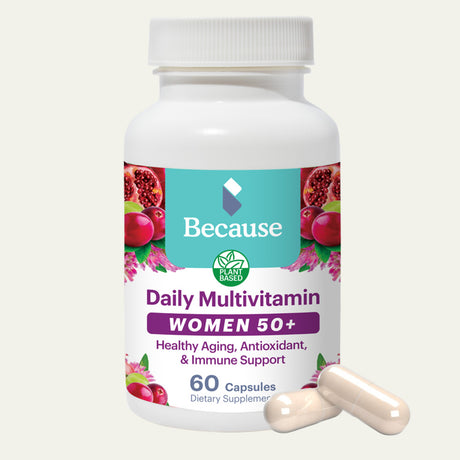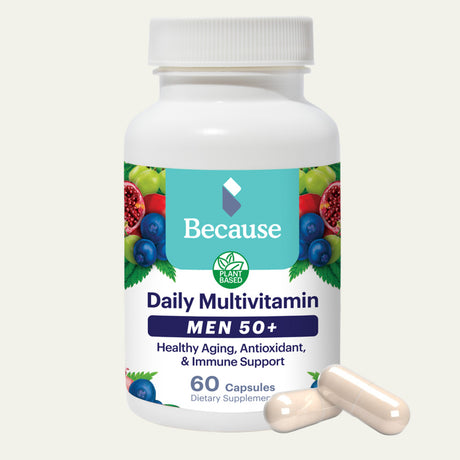Urinary tract infections, or UTIs, are common in older adults. Roughly 10% of women over 65 will experience one, and an estimated 30% of women aged 85 and older will develop at least one. UTIs occur when E. coli or other bacteria enter the urinary tract. The urinary tract contains the urethra (the tube that carries urine out of the body), bladder (the organ that stores urine), kidney (the organ that filters blood and produces urine), and ureters (tubes that carry urine from the kidneys to the bladder).

Bacteria can enter the urinary system in a variety of ways. While it may not be possible to fully prevent bacterial growth, you can take steps to reduce your risk for UTIs and lower the likelihood of developing a second UTI after an initial infection. In this post, we discuss the causes and symptoms of UTIs in older adults and share some of the best ways to lower the risk of infection.
10 Ways to Prevent UTIs and Promote Urinary Tract Health
Men and women of all ages can benefit from taking steps to address UTI risk factors, but for people who have already had at least one UTI, prevention is an excellent idea. Once you experience one urethra, ureter, or bladder infection, your risk of developing another one rises. In fact, an estimated 53% of women over the age of 55 will have a second infection within one year. Older women and men can follow these tips to reduce the risk of first and recurrent UTIs.
1. Avoid Skin Irritants
Irritated skin in the genital area can put you at a greater risk for UTIs. When tissue becomes inflamed, bacteria are more likely to get trapped in the urethra and cause an infection. As a result, older people should look for gentle, hypoallergenic, or skin-safe personal care products, including:
- Soaps and body washes
- Bubble baths, soaks, salts, and oils
- Feminine care products like feminine hygiene sprays and washes
- Body Powders
- Incontinence skin care products like barrier creams and wipes
If you develop irritation when using a product, discontinue use immediately and look for alternative products.
2. Drink Plenty of Fluids
Fluid intake is an essential part of urinary health and UTI prevention. Urine plays an important role in overall urinary health. Each time you urinate, it helps flush microbes out of your bladder and urethra. If you don't urinate frequently enough, bacteria growth is more likely to occur.
Staying hydrated aids in urine production by providing the liquid needed to produce the bodily fluid. Water intake is a major part of hydration, but you can also get water from other drinks and from foods. Your medical provider can advise you on how much water to drink daily to support your urinary health.
3. Wipe Front to Back
Solid waste naturally contains E. coli and other types of bacteria. When you move your bowels, some of these microorganisms may remain in the area of your anus. If you wipe from back to front after you go to the bathroom, you may transfer bacteria from your anal area to your urethra. Wiping from front to back is an essential part of healthy bathroom habits for everyone, but it’s especially important for women due to the location of the urethra in front of the vagina rather than in the penis.
4. Don’t Hold It
Frequent trips to the bathroom can be a hassle, but holding your urine can put you at a greater risk for UTI. Holding urine for extended periods allows bacteria to remain in the bladder, where they can multiply and give rise to a bacterial infection. Urinating as soon as you notice the urge helps you flush bacteria out of the urinary tract.
5. Wear the Right Underwear
Wearing the wrong kind of underwear is associated with an increased risk of UTIs. Specifically, synthetic fabrics can limit airflow, leading to dampness that encourages bacterial growth. Underwear that rubs against the skin because it's too tight or loose may lead to irritation that can contribute to a UTI. To promote dryer skin and lower the likelihood of inflammation, choose breathable, 100% cotton panties or briefs and avoid seamless undergarments, G-strings, and thongs.
6. Take Showers Instead of Baths
Switching to showers may reduce your risk of UTIs if you usually take baths. Warm water can encourage bacterial growth, meaning that although relaxing, a long soak could give rise to an infection. For those worried about the chance of a fall, installing grab bars or using a shower seat may make it possible to shower more safely.
7. Avoid Food and Drinks That Irritate the Bladder
Many compounds in foods and drinks that your body can't utilize are filtered out by your kidneys and end up in urine stored in the bladder. Some may be too harsh for your bladder and trigger inflammation. Bladder irritation can contribute to incontinence and cause unpleasant symptoms like frequent urination. When the bladder is irritated, it can increase the risk of a UTI.
Some common bladder irritants include:
- Sugar and artificial sweeteners like aspartame and saccharin
- Caffeine found in coffee, tea, energy drinks, and chocolate
- Citrus fruits like oranges, limes, lemons, and grapefruit
- Other acidic fruits like pineapple, cantaloupe, apples, grapes, peaches, plums, and strawberries
- Tomatoes and tomato products like pasta sauce
- Dairy products like milk, cheese, and yogurt
- Alcoholic beverages, including wine, beer, and spirits
- Spicy foods and chili peppers
- Vinegar
- Soy sauce
- Onions
Most people won't need to avoid all of the above foods. The best way to determine which ones may be triggering irritation is to eliminate them all from your diet and then add them back in one at a time. Alternatively, you can keep a symptom journal where you record what you eat and drink and whether you experience urinary pain or discomfort afterward.
8. Utilize Proper Incontinence Care
Incontinence makes urinary tract infections more likely to occur, but with proper incontinence care, you can lower your risk of infections. Here are some tips to follow:
- Change incontinence protection frequently: Soiled incontinence underwear may allow bacteria from the rectum to enter the urinary tract, and wet incontinence pads and underwear create moist conditions that encourage bacteria to multiply. Even without an accident, incontinence protection may promote bacteria growth if worn for too long.
- Cleanse regularly: Use a cleaning spray or cleansing wipes to remove microbes from your skin when you change your incontinence protection.
- Address irritation: Skin irritation due to incontinence may make UTIs more likely to occur. Applying a barrier cream can help to protect the skin and support healing when irritation does occur.
In addition to reducing the risk of UTIs, good hygiene can also help you feel fresher, cut down on irritation, and reduce incontinence odors.
9. Take a Probiotic + Other Supplements to Support Urinary Health
The right dietary supplements may play a role in overall urinary health and potentially reduce the risk of infection. Some supplements to consider include:
- Probiotics: Probiotics are good bacteria that are a natural part of the urinary, digestive, and immune systems. Part of their job is to help fight bad bacteria like E. coli. A probiotic supplement can help support the beneficial bacteria in the urinary tract.
- Cranberry: Pure cranberry juice, raw cranberries, and cranberry supplements may make it more difficult for bacteria to stick to the lining of the urinary tract. Studies show that cranberry may reduce the risk of a UTI by up to one-third.
- D-mannose: D-mannose is a type of sugar found in cranberries that are believed to give the fruit its bacteria-reducing benefits. Some supplements contain isolated D-mannose or cranberry standardized to contain a certain percentage of the active compound.
- Hibiscus: Also known as roselle, hibiscus is a flowering plant native to tropical and subtropical biomes. The results of animal studies indicate that it may reduce inflammation in the urinary tract.
- Dandelion: This flowering plant grows throughout North America and has been used as a natural remedy for centuries. Research shows that the herb has antibacterial benefits, which could make it beneficial for reducing inflammation in the urinary tract.
Generally, supplements should be considered part of your overall healthy lifestyle. Talk to your healthcare provider before taking any new supplement for the first time. There is no evidence to suggest that any supplement is more effective than medication for treating UTIs, so you should never try to take cranberry extract or another supplement to cure an existing infection.
10. Talk to Your Doctor About Hormone Replacement Therapy
After menopause, estrogen levels in women dramatically decline. This leads to many changes in the reproductive and urinary systems. Vaginal dryness and irritation are more likely to occur, and the vagina and urinary tract linings grow thinner and more delicate. In addition, lower estrogen levels may cause a decline in good bacteria. One possible solution to the effects of low estrogen is hormone replacement therapy or HRT. One study found that women who used HRT were less likely to develop recurrent UTIs and had higher levels of probiotics in their urine.

Although there is scientific evidence to support the use of HRT in women prone to UTIs, the medication isn't ideal for anyone. HRT may increase the risk of breast cancer, heart disease, stroke, and blood clots in some women. As a result, it's crucial to weigh the benefits and drawbacks of estrogen replacement therapy with your healthcare provider to determine if it's the best choice for you.
Are Older Adults at Higher Risk of UTI?
The risk of UTIs increases with age; the older a person is, the more likely they are to develop a UTI. Because the immune system slows down with age, older adults are also more prone to experiencing complications from UTIs, such as kidney and blood infections.
Common Causes of Recurring UTIs in Older Adults
The most common cause of UTIs is bacteria, and older adults may be more likely to have bacteria in their urinary systems or be more vulnerable to microbes. Some of the reasons for a higher incidence of UTIs in seniors include:
- Diabetes: Diabetes can lead to poor immune system function, making it hard for the body to fight off infections
- Mobility problems: Older adults may struggle to get to the bathroom and hold their urine as a result. Lack of mobility can also make it difficult for seniors to drink plenty of water.
- Incontinence: People with fecal or urinary incontinence are more prone to UTIs.
- Sexual activity: Sexual intercourse can introduce bacteria to the urinary tract. Urinating immediately after sex may help to reduce the risk of UTI.
- Multiple sclerosis (MS): People with multiple sclerosis may not fully empty their bladders when they urinate, increasing the risk of UTI.
- Memory problems: Older people with Alzheimer's or dementia may not use proper hygiene techniques, use the bathroom promptly, or drink enough water and other fluids.
- Hormonal changes: Postmenopausal women are more prone to UTIs due to changes in the vagina and bladder that occur when estrogen levels drop.
Common Signs of Urinary Tract Infections in Older Adults
Some common UTI symptoms in older adults include:
- Frequent urge to urinate
- Strong urge to urinate that may result in accidents
- Painful urination often described as a burning sensation
- Abdominal pain and pressure
- Back pain or tenderness
- Nausea
- Fatigue
- Confusion
- Fever
Kidney stones, sexually transmitted diseases, and other conditions may cause similar symptoms, so it's important not to try and self-diagnose. Only healthcare professionals can analyze a urine sample to determine if you have a UTI and prescribe the proper medical treatment to treat it, such as a course of antibiotics.
What to Do if You Suspect You or a Loved One Has a UTI
When left untreated, a lower urinary tract infection can lead to a potentially life-threatening kidney infection — but the good news is that treatment for UTIs is usually as simple as taking oral antibiotics. If your loved one is experiencing symptoms of a UTI like frequent urination or a burning sensation, seek treatment at a doctor's office or an urgent care center. Make sure they continue antibiotic use until the prescribed supply is gone and then begin implementing the preventative measures to lower the likelihood of recurring infections.
Shop probiotics and supplements to prevent UTIs and promote urinary tract health online at Because Market.
Sources:
Cleveland Clinic. (2020). The Truth About UTIs in Older Adults. https://consultqd.clevelandclinic.org/the-truth-about-utis-in-older-adults/National Center for Biotechnology Information. (2019). Cranberry. In LiverTox: Clinical and Research Information on Drug-Induced Liver Injury (3rd ed.). https://www.ncbi.nlm.nih.gov/books/NBK557479/
National Center for Complementary and Integrative Health. (2016). Cranberry. https://www.nccih.nih.gov/health/cranberry
Tariq, R., Cho, J., & Kapoor, A. (2016). Age-Related Immune Response and Risk of LUTS/BPH and Prostate Cancer: Can Lifestyle Modification Improve Clinical Outcomes? Reviews in Urology, 18(4), 229-242. https://pubmed.ncbi.nlm.nih.gov/27773797/
Simon, M., Bernard, H. U., & Moroianu, A. (2018). Effect of Intravaginal Estrogen on the Composition of the Urogenital Microbiome. Maturitas, 115, 73-76. https://www.ncbi.nlm.nih.gov/pmc/articles/PMC5817818/
PracticeUpdate. (2020). EAU 2020: Menopausal Hormone Therapy May Confer Resistance to UTIs. https://www.practiceupdate.com/content/eau-2020-menopausal-hormone-therapy-may-confer-resistance-to-utis/103930














